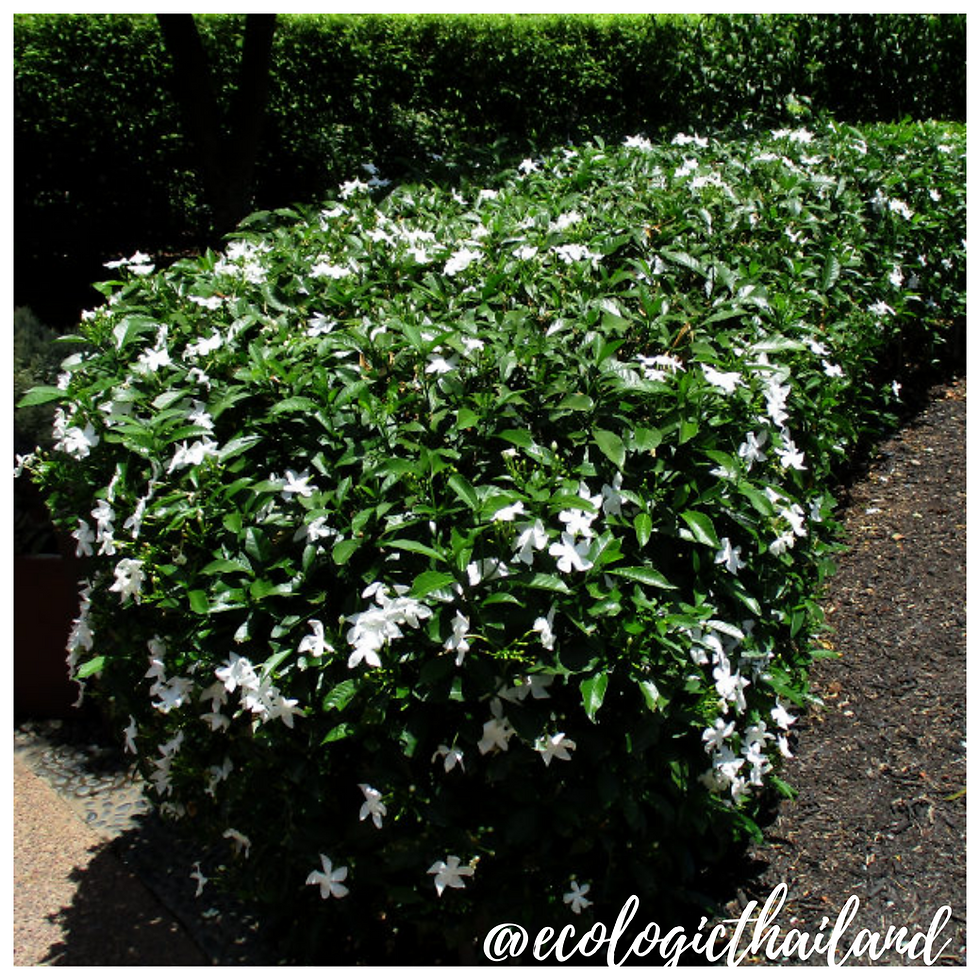Thai Eggplant
- Eco-Logic Resort
- Jan 25, 2021
- 3 min read
Makuea Praow | มะเขือเปราะ | Solanum melongena
Family: Solanaceae - Genus: Solanum

The Thai eggplant is grown in the vegetable gardens of the Thai Child Development Foundation. You will mostly find the striped green-white variant of the eggplant here.
Thai eggplants, are members of the nightshade family, along with potatoes, tomatoes, and peppers. Also known as Round eggplant, Makua pot, and Ma keua praw, Thai eggplant varieties are known for containing some of the smallest cultivated eggplant.
Thai eggplants are usually round, sometimes elongated. and can be green, yellow, purple or white.
The green-white varieties are the most common eggplants in Thai cooking, they are about the size of a golf ball.
Thai eggplants are available year-round.

THE PLANT
The Thai eggplant is a tropical perennial plant.
The stem is often spiny.
Eggplant grows 40 to 150 centimeter tall.
Semi wild types can grow much larger, to 225 centimeter.

THE LEAVES
The Thai eggplant has large, coarsely lobed leaves that are 10 to 20 centimeter long and 5 to 10 centimeter broad.

THE FLOWERS
The flowers are white to purple in color, with a five-lobed corolla and yellow stamens.

THE FRUIT
Botanically classified as a berry, the fruit contains numerous small, soft, edible seeds that taste bitter because they contain or are covered in nicotinoid alkaloids, like the related tobacco.
Some common varieties of the eggplant have fruit that is egg-shaped, glossy, and purple with white flesh and a spongy, "meaty" texture. Some other are white and longer in shape. The cut surface of the flesh rapidly turns brown when the fruit is cut open.
CULINARY USES
Thai eggplants can be consumed in both raw and cooked applications such as grilling, frying, baking, pureeing, stewing, stuffing, and pickling.
This eggplant is unique because unlike other eggplant varieties that require cooking, it can be used in raw preparations, such as salads.
The seeds are edible but can be difficult to chew.
In cooked applications, Thai eggplants are most commonly used in curries, and when cooked they become soft and soak up the sauce with ease. They can also be sliced and added to stir-fries or battered and fried into a tempura side dish.
Thai eggplant pairs well with aromatics such as garlic, ginger, and onions, herbs such as basil, oregano, cilantro and parsley, nightshade family members including tomatoes, potatoes, and peppers, as well as coconut milk, soy sauce, shellfish, and poultry.
You can click on the link of the Food Forest Kitchen Restaurant to find some recipes with Thai eggplant as made in the Food Forest Kitchen Restaurant.
NUTRITION
One cup (82 grams) of raw eggplant contains the following nutrients (2):
Calories: 20
Carbs: 5 grams
Fiber: 3 grams
Protein: 1 gram
Manganese
Folate
Potassium
Vitamin K
Vitamin C
Eggplants also contain small amounts of other nutrients, including niacin, magnesium and copper.
TRADITIONAL MEDICINAL USE OF NEEDLE FLOWER
NOTE: please take advice from a doctor if you are planning to use herbal medicine.
Eggplant is also widely used for medicinal purposes. Various plant parts are used in decoction, as powder or ash for curing ailments such as diabetes, cholera, bronchitis, dysuria, dysentery, otitis, toothache, skin infections, asthenia and hemorrhoids.
INTO THE WILD: a down to earth experience

For guests and visitors to Paksong we organize weekly tours "The Edible Forest" and Foraging weekends: Into the Wild. We work with local guides to take you in the jungle of Paksong. After foraging, we will cook a meal with the ingredients, using bamboo together with you!
Come and join and learn about the abundance of food that nature gives us!
INTO THE WILD!


















Comments